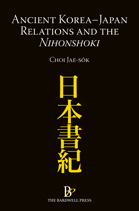
|
Ancient Korea-Japan Relations and the Nihonshoki
By Choi Jae-sŏk
25 March 2011, hardback, 320 pp.
ISBN: 978-1-905622-10-8
Ancient Korea–Japan Relations and the Nihonshoki represents the distillation of 15 years of research by Choi Jae-sŏk into ancient Korea–Japan relations. The author analyses nineteen elements of the Nihonshoki, which, as he asserts, is more than a history of ancient Japan, it is also a history of ancient Korea–Japan relations.
The major aspects examined are: the mass emigration of Paekche refugees to Yamato-Wa (Japan); the territorial extent of Yamato-Wa; the limited extent of the Yamato-Wa kings’ (emperors’) royal power; the comparative backwardness of the shipbuilding and navigation skills of the Japanese in the periods in question; and, most significantly, the author’s assertion that from around A.D. 500 Yamato-Wa was administered by Paekche kings.
As a result of these analyses the author contests that, contrary to the commonly-held view in Japan that ancient Korea was a colony of ancient Japan (Yamato-Wa), the evidence suggests that this was not the case. In fact, the author states that, at least from the beginning of the sixth century, Yamato-Wa was administered by Paekche officials dispatched by Paekche kings.
Contents
Foreword
Prologue
CHAPTER I–The Nihonshoki Compilers’ Awareness Levels of China and Korea
CHAPTER II–The Nihonshoki Accounts of a Mass Exodus of Paekche Emigres to Yamato District circa A.D. 400 and its Cover-up Accounts
CHAPTER III–Village Names of Yamato and Kawachi Districts as Recorded in the Nihonshoki
CHAPTER IV–The Territorial Extent of Japan and Regal Power of Yamato-Wa Kings as Recorded in the Nihonshoki
CHAPTER V–Yamato-Wa’s Levels of Shipbuilding and Navigation as Recorded in the Nihonshoki
CHAPTER VI–Paekche’s Administration of Yamato-Wa in the Sixth Century A.D. and the Great Standing Buddha at Yumedono of the Horyuji Temple
CHAPTER VII–Institution of Official Ranks in Yamato-Wa as Recorded in the Nihonshoki
CHAPTER VIII–The Nihonshoki Accounts of Paekche King P’ung
CHAPTER IX–After the Defeat in the Paekkanggu Battle, Paekche Generals Retreat to Japan to Build Defensive Hill-Forts
CHAPTER X–The Jinshin War and the Nationality of the Commander-in-Chief on the Afumi Side as Recorded in the Nihonshoki
CHAPTER XI–Tang’s Advance into Yamato-Wa (664–672) After the Fall of Paekche in the 7th Century
CHAPTER XII–The Killing of Soga no Iruka and His Father by Paekche King Ŭija and the “Taika Reform”
CHAPTER XIII–Prince Shotoku as Described in the Nihonshoki
CHAPTER XIV–The Nihonshoki’s Fabrication that Yamato-Wa Kings Established Miyake (Colonies) in Ancient Korea and Many Locations in the Japanese Islands
CHAPTER XV–The Yamato-Wa Army
CHAPTER XVI–Accounts of Koguryŏ
CHAPTER XVII–On Shilagi (Shilla) as Described in the Nihonshoki
CHAPTER XVIII–The Samguk sagi’s Accounts of Kaya and the Nihonshoki’s Accounts of Mimana
CHAPTER XIX–The Political Milieu of Ancient Japan and Korea–Japan Relations
CHAPTER XX–Some Remarks on W. G. Aston’s Nihongi
Glossary
Bibliography
List of Major Works by the Author
Index
About the Author
Choi Jae-sŏk (b. 1926) was a visiting professor at the Harvard-Yenching Institute (1966–1967), a professor of sociology at Korea University (1966–1991), and is currently a professor emeritus at the same university.
He has written ten books on ancient Korea–Japan relations and thirteen books on the Korean family and social history. Two of his early works were translated and published in Japan.
In recognition of his research he was awarded the Seoul City Cultural Prize in 1967 for A Study of the Korean Family, the First Academic Prize from the Korean Sociological Association in 1994 for
A Study on the History of the Korean Family System, and was awarded the 46th 3∙1 Cultural Prize in 2005 for several of his books on ancient Korea–Japan relations, including the original Korean edition of this book. |



